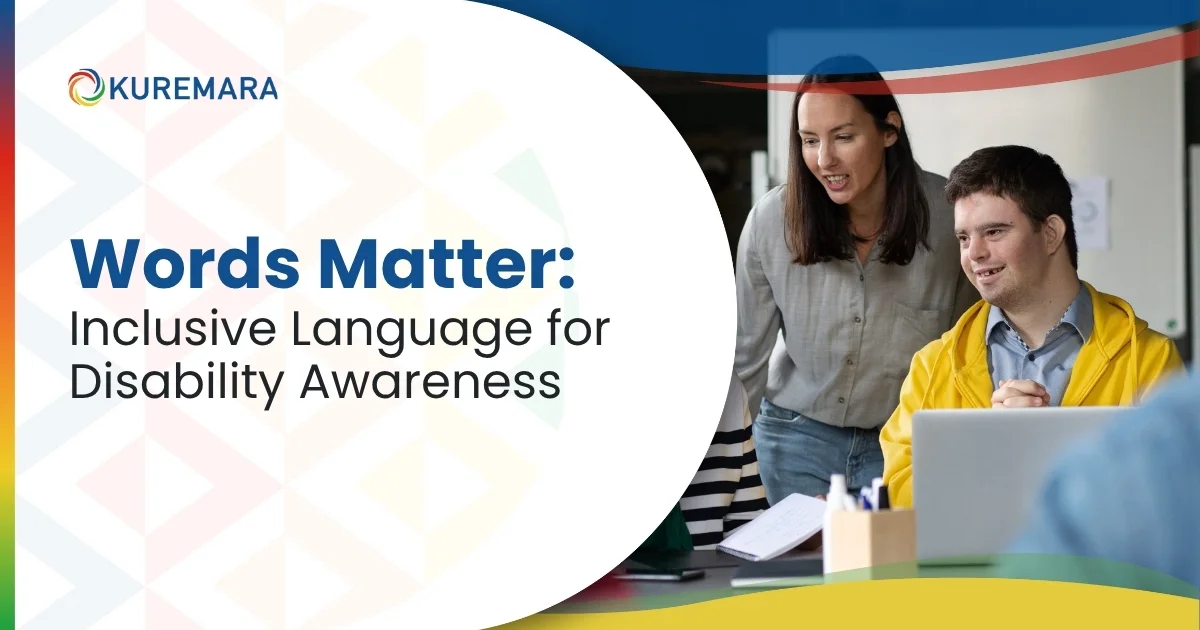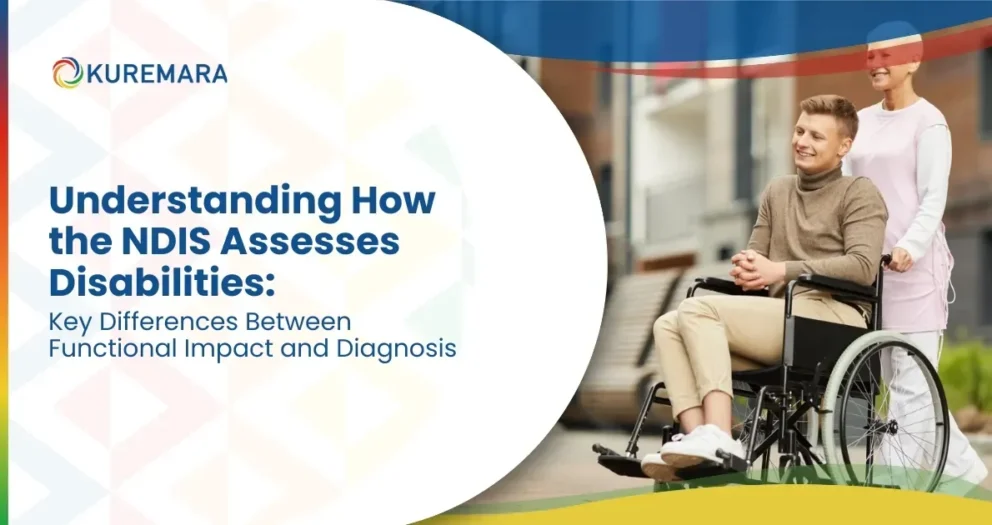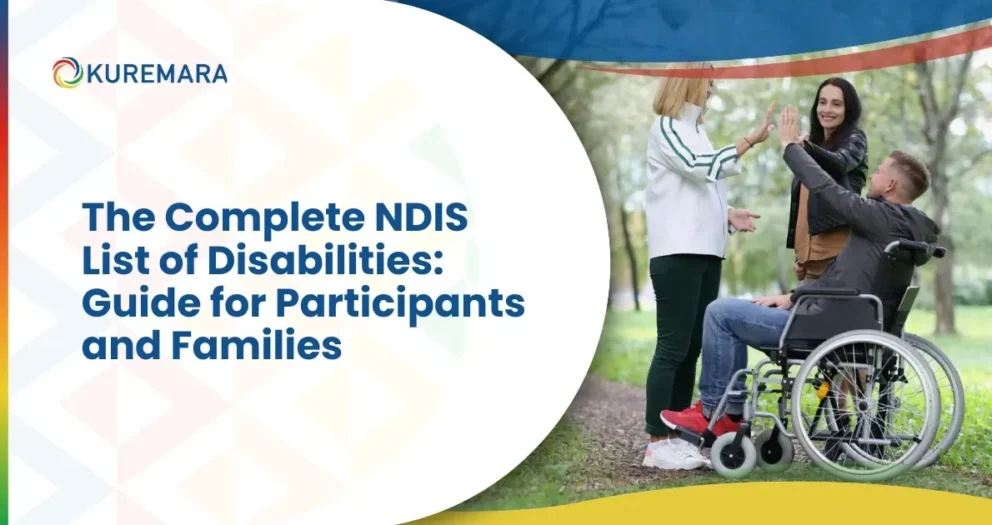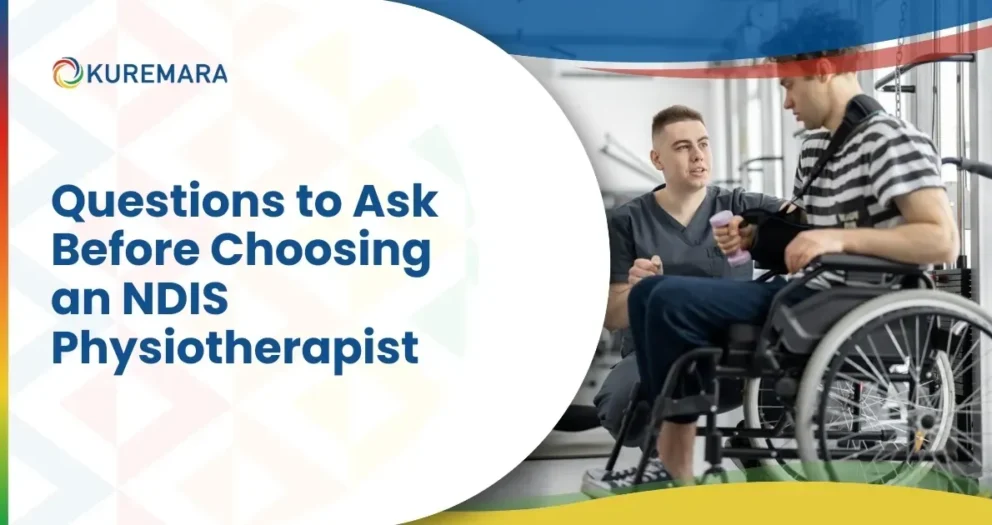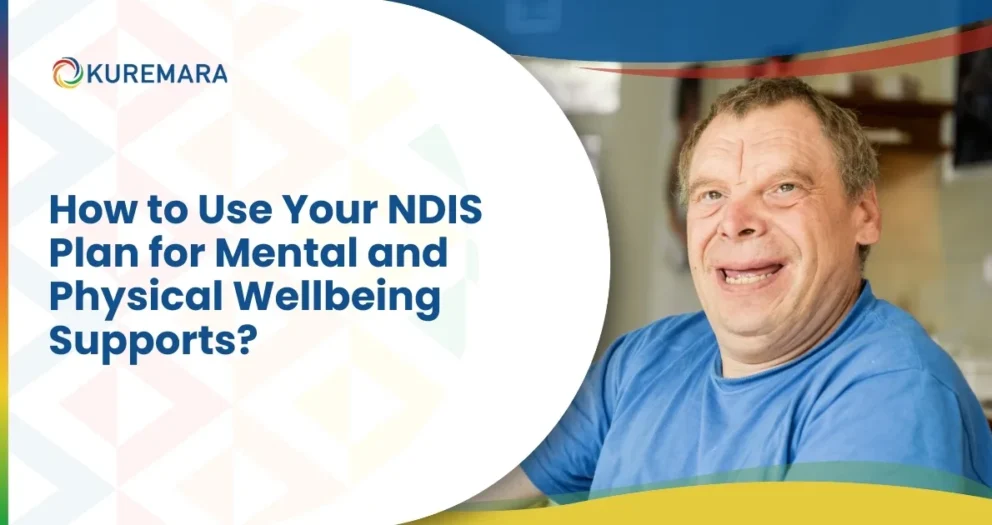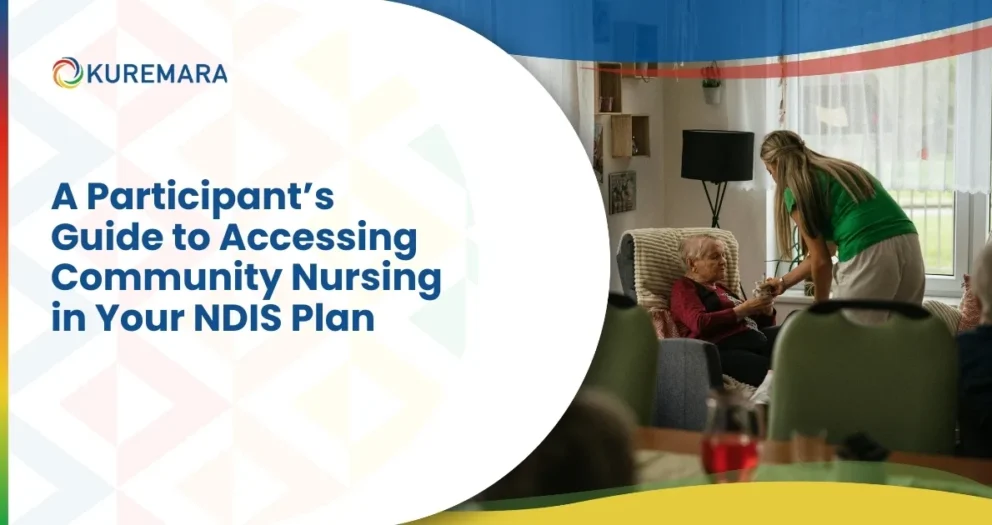Ever stopped to think about the power of the words we use? Our words can either uplift or isolate. A casual remark or a throwaway comment can have a deeper impact than we realise—especially when speaking about or to someone with a disability.
At Kuremara, we are committed to creating a community where every individual is seen, respected, and valued. And one of the most powerful tools we have to achieve this is inclusive language—a million-dollar insight that costs nothing but can change everything.
Unfortunately, language that isn’t inclusive can make people with disabilities feel excluded, stereotyped, or even dehumanised. Simple word choices, made without thought, can build walls instead of bridges.
This blog will serve as your guide to inclusive communication, empowering you with the knowledge and practical tools to interact more mindfully. By choosing our words carefully, we can help build a nation where everyone—regardless of ability—feels like they belong.
In the context of the NDIS and the evolving support landscape, inclusive communication isn’t just respectful—it’s essential.
Why Words Matter: The Impact of Language
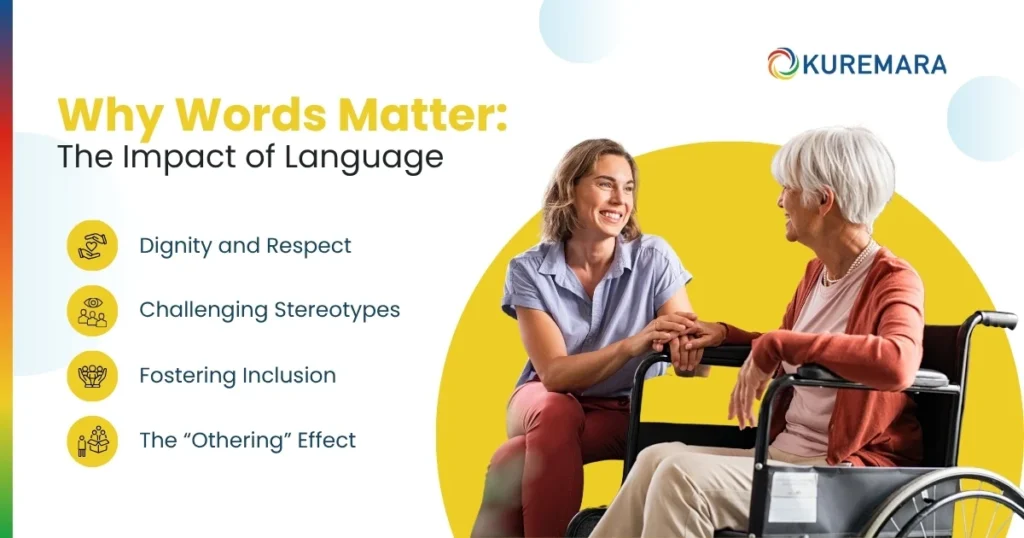 Words are more than just sounds or symbols—they shape our reality. For individuals with disabilities, the language used to describe them can affirm their dignity or diminish their value.
Words are more than just sounds or symbols—they shape our reality. For individuals with disabilities, the language used to describe them can affirm their dignity or diminish their value.
-
- Dignity and Respect: The right words affirm a person’s identity and humanity. When we speak inclusively, we communicate that we see and respect people for who they are, not just their diagnosis.
- Challenging Stereotypes: Inclusive language dismantles outdated assumptions, allowing individuals to be seen as more than their disability. It shifts the focus from “what’s wrong” to “who they are.”
- Fostering Inclusion: Language that recognises people with disabilities as equal members of society builds a sense of belonging and encourages participation in everyday life.
- The “Othering” Effect: Terms like “them” or “those people” create unnecessary distance. Phrases that make someone feel like an outsider—consciously or not—can isolate and alienate.
At Kuremara, we believe that every person has the right to feel seen, heard, and valued. Our words should reflect that belief.
What to Say: Embracing People-First Language
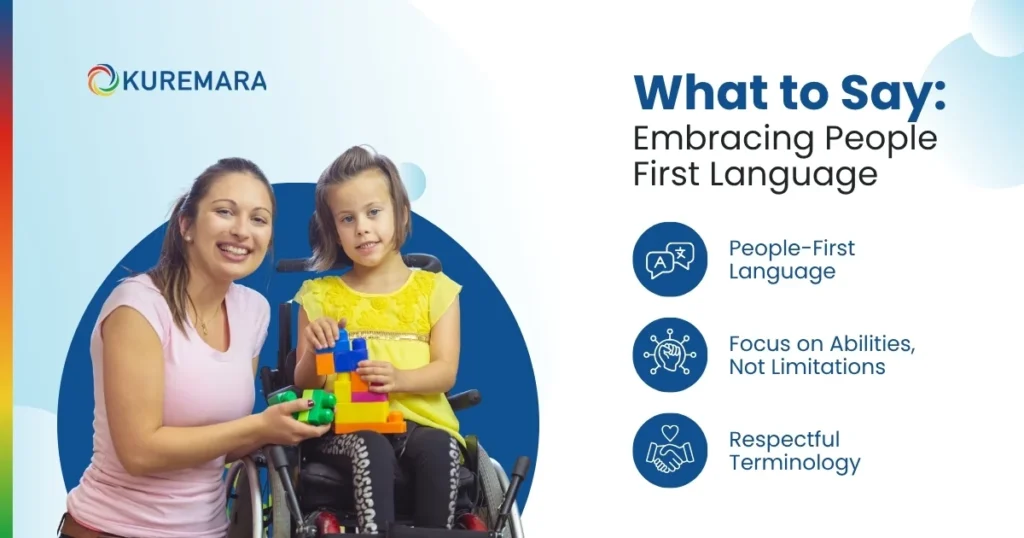 The foundation of inclusive communication is People-First Language—a way of speaking that emphasises the person, not the disability. This approach is grounded in respect, dignity, and the recognition that a disability does not define someone’s entire identity.
The foundation of inclusive communication is People-First Language—a way of speaking that emphasises the person, not the disability. This approach is grounded in respect, dignity, and the recognition that a disability does not define someone’s entire identity.
Core Principle:
-
-
- Instead of “disabled person,” say “a person with a disability.”
-
-
-
- This small shift centres the individual and recognises that their disability is just one part of their life.
-
Examples of People-First Language:
-
-
- “Wheelchair-bound” → “uses a wheelchair”
-
-
-
- “Afflicted by cerebral palsy” → “has cerebral palsy”
-
-
-
- “Suffers from a condition” → “experiences a condition”
-
-
-
- “The disabled” → “people with disabilities”
-
Focus on Abilities, Not Limitations:
Choose a language that celebrates strengths –
-
-
- “He’s great with numbers” vs. “Despite his disability, he can count.”
-
-
-
- “She’s passionate about art” instead of focusing on what she cannot do.
-
Respectful Terminology:
-
-
- Use “disability” rather than outdated or loaded terms like “handicap.” “Disability” is the preferred and respectful term within the sector.
-
-
-
- When referring to specific conditions, do so accurately and only when relevant. For example, “person with autism” rather than “autistic person,” unless the individual prefers the latter.
-
Open and Respectful Dialogue:
If you’re unsure of which term to use, just ask. Many people with disabilities appreciate the effort and are happy to share what terminology they’re comfortable with. Being respectful goes a long way.
This approach aligns with insights from leading disability support resources, like Support Network, which also encourages mindful word use and active listening.
What to Avoid: Common Pitfalls and Harmful Phrases
 Despite good intentions, many common expressions can unintentionally cause harm. Here’s what to avoid and why it matters:
Despite good intentions, many common expressions can unintentionally cause harm. Here’s what to avoid and why it matters:
Outdated and Derogatory Terms:
Terms such as “crippled,” “retarded,” “handicapped,” or “invalid” are offensive and carry painful historical weight.
Replace with terms like “person with a disability” or a more specific, respectful description when relevant.
Minimising or Patronising Language:
Praising someone as “inspirational” for completing everyday tasks can feel patronising. Adults with disabilities don’t want to be seen as brave for living their lives—they want to be treated like everyone else.
Avoid talking down or using a sing-song voice when speaking to adults. Address them with the same tone and respect as you would anyone else.
Assumptions and Stereotypes:
-
-
- Don’t assume a person’s capabilities based on their disability.
-
-
-
- Avoid guessing what their needs are—ask first.
-
-
-
- Never presume the cause of a disability or use it as a talking point.
-
Language that Focuses on Deficit:
Phrases like “confined to a wheelchair” or “suffers from” place undue emphasis on what a person lacks. Instead, describe their situation neutrally and respectfully.
Overly Sympathetic or Pitying Language:
Pity is not helpful—it positions the person as less fortunate or less capable. Focus on understanding, respect, and support instead.
Support Network resources highlight the importance of avoiding such terms and encourage embracing language that empowers and respects the person.
Practical Tips for Mindful Conversations
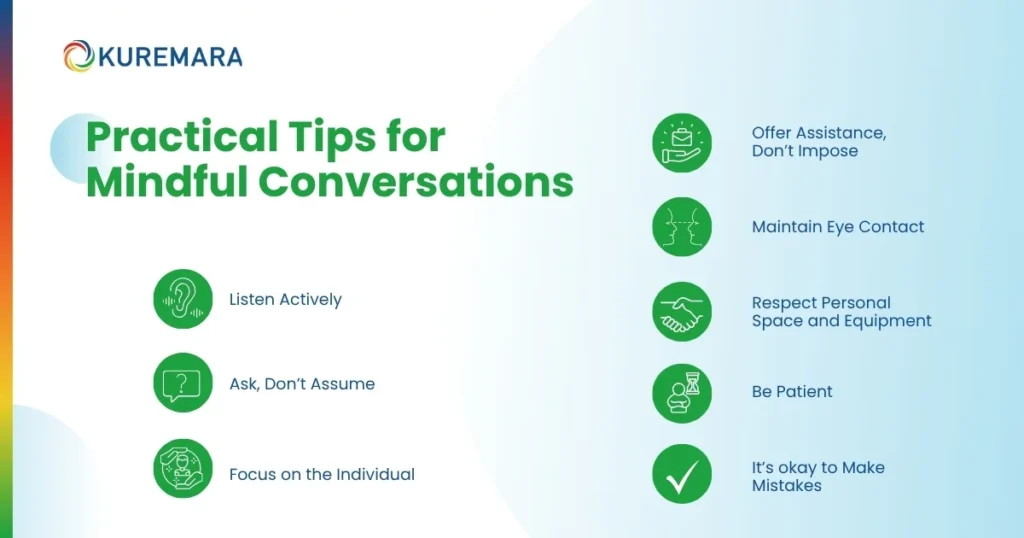 Being mindful doesn’t mean you have to walk on eggshells—it just means approaching interactions with awareness and empathy.
Being mindful doesn’t mean you have to walk on eggshells—it just means approaching interactions with awareness and empathy.
1. Listen Actively:
Pay close attention to how someone describes themselves or their condition. Let them guide the conversation.
2. Ask, Don’t Assume:
It’s okay not to know. Politely ask how someone prefers to be addressed or if they need assistance.
3. Focus on the Individual:
See the person first. Their disability is just one aspect of who they are.
4. Offer Assistance, Don’t Impose:
Offer help with a simple question like, “Would you like a hand?” rather than jumping in.
5. Maintain Eye Contact:
When speaking with a person with a disability, look at them—not their companion or carer.
6. Respect Personal Space and Equipment:
Wheelchairs, canes, or service dogs are part of someone’s personal space. Never touch or move them without permission.
7. Be Patient:
Allow extra time if needed—especially in communication or mobility. Don’t rush or interrupt.
8. It’s Okay to Make Mistakes:
Everyone slips up. If you say the wrong thing, correct yourself and move on. Intent matters just as much as words.
Kuremara’s Commitment to an Inclusive Environment
At Kuremara, inclusion isn’t just a checkbox—it’s our way of life. We believe in a society where people with disabilities are not just supported, but truly empowered.
Whether it’s through Supported Independent Living, community access programs, or NDIS support coordination, our services are designed to ensure that no one feels left behind.
We work with families, carers, and communities to build inclusive environments—starting with the language we use. Because true inclusion starts with respect.
Conclusion
Inclusive language is more than political correctness—it’s a statement of who we are and who we want to be as a nation.
By choosing our words thoughtfully, we affirm the dignity of individuals with disabilities, break down barriers, and create environments where everyone feels at home.
The million-dollar insight? It doesn’t cost a cent to speak with kindness, clarity, and compassion—but the impact can be life-changing.
Let’s collectively choose words that build bridges, foster respect, and celebrate the incredible diversity that makes our world truly unique.
Speak with Respect. Communicate with Care.
 Our easy-to-use checklist breaks down what to say and what to avoid when talking about or to people with disabilities. Whether you’re a caregiver, educator, professional, or everyday Aussie—this guide will help you communicate with greater awareness and compassion.
Our easy-to-use checklist breaks down what to say and what to avoid when talking about or to people with disabilities. Whether you’re a caregiver, educator, professional, or everyday Aussie—this guide will help you communicate with greater awareness and compassion.
 care@kuremara.com.au
care@kuremara.com.au
